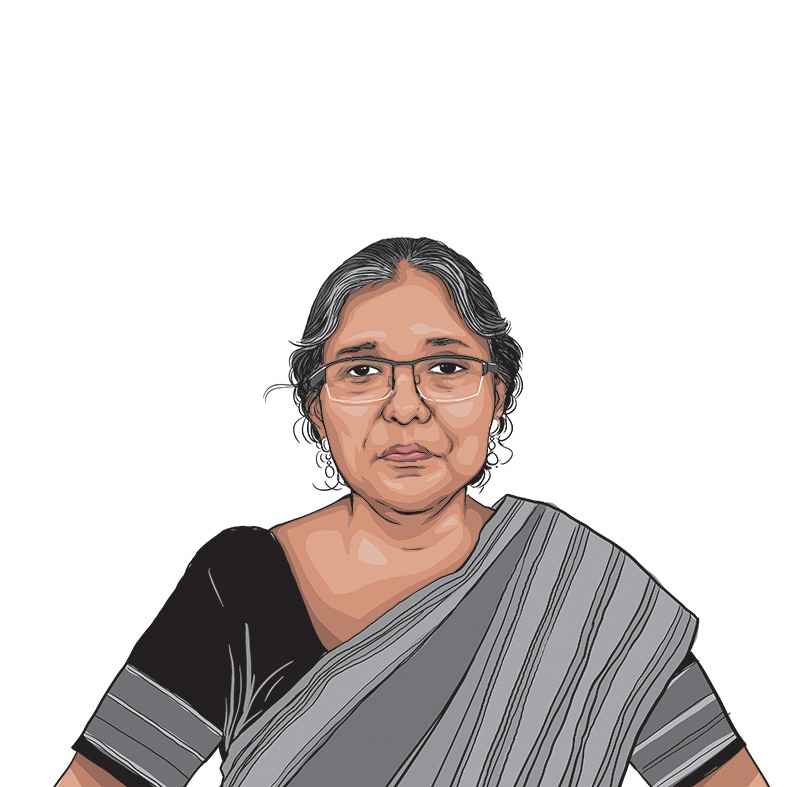Opinion What freedom means to me as a tribal woman in academia
It means balancing empowerment through education with my cultural inheritance
 Students during the Maths Extra classes in a Delhi Government School, Veer Savarkar School. (Express Photo: Abhinav Saha)
Students during the Maths Extra classes in a Delhi Government School, Veer Savarkar School. (Express Photo: Abhinav Saha) Growing up in the ’60s and ’70s in Ranchi, listening to the first-hand experiences of August 15, 1947, narrated by my parents was enthralling. Emotions would surge on Independence Day and Republic Day, induced by the tales of those who had been part of the Azad Hind Fauj. The special events of Bharat Scouts and Guides, committed to nurturing leadership qualities in young students, mostly tribal, would exhibit the commitment of school teachers to nation-building that went beyond education. Schools would not leave any stone unturned in passing on the dream of Azad Bharat to pupils. At the Hindi medium school for girls that I attended, hoisting the National Flag and reciting the pledge was an honour, a special task assigned on such occasions. It was made clear that to be born in Azad Bharat was not only a blessing, but a responsibility. The gift of Independent India came with multi-faceted challenges to the tribal heartland of Jharkhand.
The values inculcated in me by the sense of societal responsibility, alongside the personal aspirations nurtured at school and home, have been foundational to my journey so far. Born into an Oraon (Scheduled Tribe) family and being part of the second generation accessing higher education from my father’s side and third from my mother’s side, balancing empowerment through education with cultural inheritance was for me a choice, not a challenge.
My social background and the geo-political environment I grew up in have a significant bearing on my idea of freedom. My idea of freedom is culturally rooted in the values and ethos of being an Adivasi and a Christian by faith. Being respectful of the space that the “other” needs is a founding principle. The “other” for an Adivasi, includes not just members of the clan and society, but also the animal and plant kingdoms. Fraternity is an important cultural value in Adivasi communities so, in a sense, the Preamble of the Constitution of India is no mere abstract concept for us.
Growing up in Ranchi, away from the village, my parents ensured that we were exposed to the realities of the society we hailed from. We were made familiar with our cultural practices and language. In the beginning, the medium of instruction was a barrier, but I was able to excel in my studies. Rote learning and tuition were discouraged and my teachers were mostly Adivasi women, each of whom was a role model for the students in her own way.
Freedom for me, as a young Adivasi girl, was to be able to excel in all areas that the school provided space for. Academics took precedence over my love for cultural activities and sports. However, I was quite unprepared for the unpleasant surprises that awaited me as I advanced in my studies. I was blessed that my parents, in their own small ways, had participated in activities aligning with the freedom struggle. My mother would not forget to remind us how they had the parade on August 15, 1947, and saluted the Tricolour. My parents pursued their vision of nation-building by finding ways to empower Adivasis, especially in Jharkhand. Unequal treatment or blatant discrimination against Adivasis cropped up in various conversations they had with their peers, which I often had the opportunity to overhear. It was difficult for me to grasp why this discrimination occurred when my school actively propagated the spirit of the National Pledge and the Preamble to the Indian Constitution.
When I was in Class VII, a young Panditji, newly appointed to teach us Sanskrit after the retirement of the previous Panditji, asked me as he entered the class, “Jharia, tum Sanskrit me sabse zyada number kyon lati ho? Yeh to Aaryanon ki bhasha hai (Jharia why do you score highest in Sanskrit? This is the language of Aryans).” This was the first time that my freedom to excel in academics was subject to the agenda of othering. I did not understand that for a tribal girl to outperform the non-tribal students in Sanskrit undermined the caste-based hegemony in academic spheres. However, another surprise awaited me when I picked advanced mathematics as my elective subject in matriculation. I loved mathematics and had always been the topper in the subject. My Math teacher (who was also a non-tribal) told me to take up biology in college as I would not be able to cope with mathematics in college. Excelling once again in the subject that I was best at helped me develop the resilience needed to withstand and overcome the challenges that I would face further on in my academic career. I am sure this sense of freedom resulting in resilience to caste-based discrimination fuelled my attitude towards liberty, enabling me to apply for vacancies, before implementation of reservation in higher education institutions. I was selected for jobs, too.
I hope the spirit of the Constitution of India, captured in the Preamble, will become the reality when more individuals and communities from marginalised sections of Indian society resolve to apply the values of equality, liberty and fraternity for justice. Being one of only four Adivasi Vice-Chancellors — for a short term of three years June 2020 to June 2023 at Sido Kanhu Murmu University, Dumka, Jharkhand — is an indication that there are miles to go before each child born as Indian breathes the air of Azad Bharat.
The writer is professor, School of Computer and Systems Sciences, JNU and former Vice-Chancellor, Sido Kanhu Murmu University, Dumka






